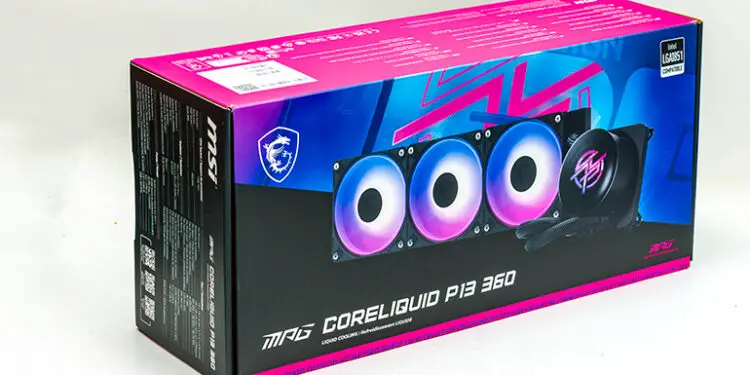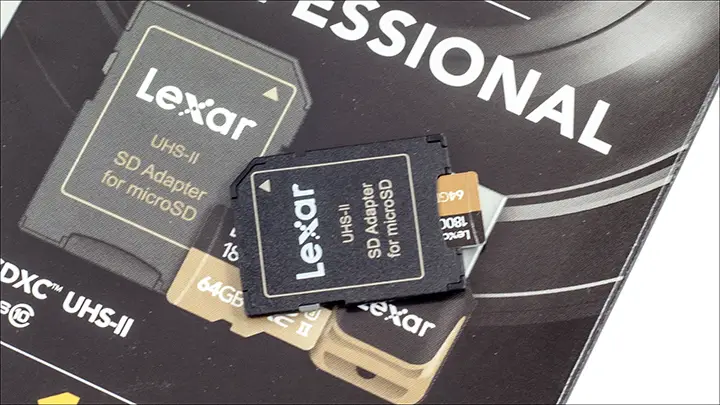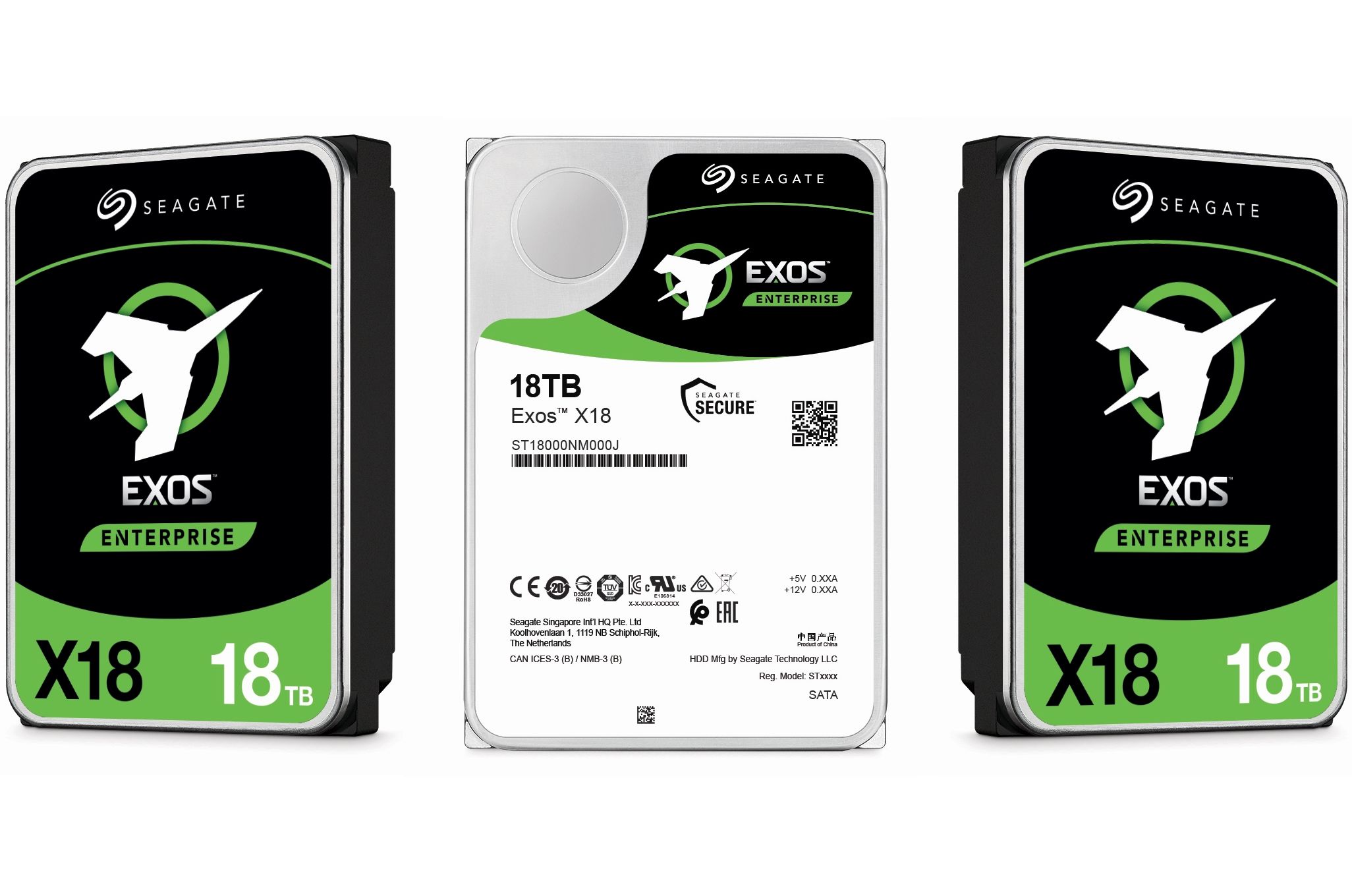
As we have said in the past, there are basically 4 key areas that an AIO team has to get right. The fans. The radiator. The Waterblock… and the overall aesthetics. Let’s start with the “looks” of an AIO… as for many buyers this is what will be the final deciding factor between two equally(ish) options. Here, there is a mighty fine line between understated elegance and bland minimalism… and too many try for the former but end up firmly in the latter. Thus being DQ’ed even before it reaches the “short list” of options. Thankfully, MSI strikes a beautiful balance with the CoreLiquid P13 360 that leans into the elegance end of the spectrum while keeping its aesthetic conservative roots firmly intact. To be candid, the cooler brings a minimalist, modern design ethos with a clean black (or white) radiator that pairs well with its deep black (or rich white) tubes. Which in turn pairs perfectly with a pump housing crowned by the Raison d’être: a bright 2.1-inch LCD that’s unlike the usual smear of RGB lighting found on most AIOs.

Don’t get it twisted. This display isn’t just a pretty face — it’s fully programmable via MSI’s software, capable of showing system temps, load percentages, custom GIF animations… and thanks to its animation options baked into the software… pretty much anything you could think of. Including what is on your main monitor at any given time. Put another way, everything from a serene ocean wave-like movement to a more avant-garde amuse-bouche can easily be displayed inside your case. All without overwhelming the build’s overall aesthetics with the sadly too common “MOAR Cowbel… err… RGB” that has infected the entire industry.

Put bluntly, this is an AIO that doesn’t look like an off-the-shelf AIO. Instead, it looks more like what one would find in a fully custom water-based rig… and that… that right there is what separates the good from the greats of the industry. Which is a Good Thing™. After all this is a rather pricey model, and anything less than this level of perceived quality would have DQ’ed it faster than Roseanne Barr asking to sing the (US) National Anthem again.

Moving on. The often-overlooked hallmark of a quality cooler (be it air or water-based) is its “stock” or “out of the box” noise profile and noise envelope. Put simply, too many design teams worry more about the looks of a fan rather than how it performs. In this portion of the design, MSI got it (mostly right) with the balance between airflow and noise feeling precisely tuned… a feat that often separates mere mortal AIO coolers from the S-tier options.

To be precise, the three included fans are part of MSI’s new “CycloBlade 9 ARGB” line-up and excellent at their jobs or not… they actually are not going to be without controversy. What we mean by this is most experienced builders know (and avoid) typically 9-bladed fans for rad duty. 9-blade designs are typically focused on either offering an ultra-low noise design philosophy (i.e. intended more for case intake/exhaust duties), or a pure CFM (aka “what is this static pressure you speak of”).

These CycloBlade’s are neither. Instead, they are best accurately described as a… hybrid design. One where low noise was/is important (and thus 9 blades were used instead of a pure performance 7-blade design)…. but static pressure was equally important. So while almost 65CFM (64.89CFM to be precise) @ 2k (2050 RPM ± 150 RPM to be precise) is yawn worthy by AIO 120mm fan standards… ~65CFM at 2K with 2.59mm of static pressure and uber low noise levels is indeed noteworthy.

Put another way, these ‘CryoBlade’ fans are very, very similar to what MSI is using in their premium RTX 50-series cards… and thus are tailor-made for ‘radiator’ duty. That is key to understanding why these fans are actually good… as they are packed with R’n’D features rarely seen in a mere AIO fan. Take, for instance, the blades. All 9 are fused together at the end to create a focusing ring, which (as the term implies) focuses all the air flow down and through the fins of the radiator. Mix in ARGB gen 2 capabilities, and the only thing we are less than enthused about is the fact that they are ‘rifle’ bearing-based.
Rifle bearing is an old-school, low-cost way of increasing the lifespan of sleeve bearings via cutting a spiral lubrication groove into the “bearing” surface. So, while eons better than some AIO stock fans, a good Fluid Dynamic Bearing, let alone a ball bearing, will last longer. Of course, there is no such thing as a free lunch, and a “ball” bearing would have dramatically increased the noise levels right along with the lifespan, whereas FDB would not increase noise but would have increased the cost for only a moderate increase in lifespan. In other words, since these fans are rather quiet and have a rated 40K hour lifespans (A.K.A good four about 4 to 5 years of constant use… or about the same lifespan as the AIO they are attached to) it is hard to be too upset with them. To be blunt, they are rather good fans that, in no small part to their advanced blade design, are extremely quiet for their operating range… and thus we would recommend using them for a couple of years before you yeet them for FDB (or ‘industrial’ ball bearing) based options.
Moving on.

A few things do standout when focusing in on the tubing. Namely the sleek (and tightly braided) nylon sheathing covering said tubes and the fact that MSI has opted to hide all the cables.

Namely rather than having the builder (aka buyer of the P13) have to deal with tucking, zip tying, and generally trying to hide all the (power and ARGBv2) cables running from each fan down to the motherboard, MSI bundles all three CryoBlade 9 fans’ PWM and ARGB wires into a single daisy chain configuration… that connects right at each fan’s housing edge… and then hides most of that cable underneath this tight tube covering. Quite literally, the only wires you will see coming from the entire P13 AIO are the 3-pin pump cable, the 4-pin fan cable, the USB 2.0 cable, and the ARGBv2 cable. Bluntly stated, this new “Streamline” philosophy is a winning one.

Not a unique one. But a winning one as having all the cables routed out of sight through a discreet, reinforced exit point, not only minimizes the time it takes to make the final build look “clean”(aka more professional looking), but it also improves internal airflow. Given the fact that this AIO does not follow the ALF 1/2/3 series and includes a VRM cooling fan… the motherboard’s VRM heatsinks will need all the help it can ge,t and even moderate improvements in internal airflow can net tangible real-world benefits.
The only real nit worth picking is the fact that, unlike Arctic and their LF III, one does not get the option of choosing between a (not included) single “all-in-one” cable or a breakout multi-cable option. Instead, MSI made the multi-cable option the only option. For 99.9 percent of builds, this was the right call as the water pump should be run at a near constant 100 percent / ~3.4K RPM, or at least always high RPMs, whereas the fans should scale up and down based upon heat loads. It is just those edge cases where a build requires as few cables as possible connected to the motherboard that this lack of choice will be stifling… and the ALF III leads the way by offering both. Especially for builds where one will not be using any LED lighting, and there would have only been one cable snaking from the P13 block to the motherboard.
Thankfully, MSI does include some optionality in this regard… as they include their EZ Conn-Cable, which combines both the 4-pin and ARGB fan cables into one. Thus, allowing for only “two” cables to be seen instead of three. The only fly in the ointment is that this is not an industry-standard cable. It quite literally is the definition of proprietary and only works with MSI motherboards that offer a JAFF / “EZConn” header (v1 or v2, both will work)… which most do. We typically dislike vendor lock-in in but since you don’t have to use it, it’s more of a case of a little nod to their existing customers than some eeeeeevilll plan to kill off the competition. Hell. Let’s be honest. MSI boards are already on their way to doing that, and they don’t need any help in cutting the 800lb gorilla of the market down a peg or two.

Also firmly in the ‘win’ column is the fact that MSI took the time to spec out 26AWG and not 28AWG cabling like Arctic (and most others) use. Unlike 28AWG, 26AWG (with 80C sheathing) is good for ~4Amps. Using the 80 percent contents draw safety rule, and as long as the load is below 3.2A (or 0.53A per fan in 6-way configurations), you are golden. Considering each of these fans is rated for a mere 0.14A, this is a major safety margin that most do not give you. Color us impressed by MSI’s engineering team as this is a “little thing” that nearly everyone else – including Arctic on their ALF 3 – has rounded well below our personal (and book) safety levels… now if they would only allow us to daisy chain all six together to reduce cable clutter properly and we would be fully satisified with this cable setup.








